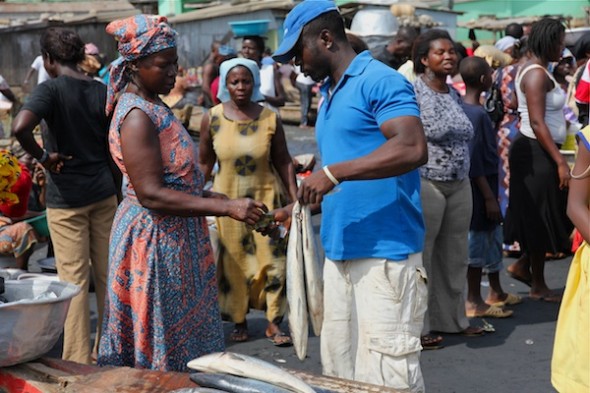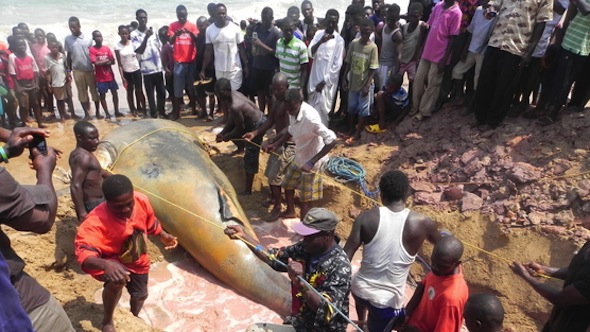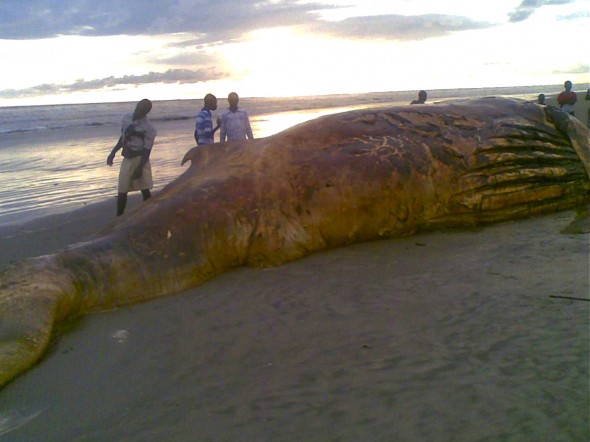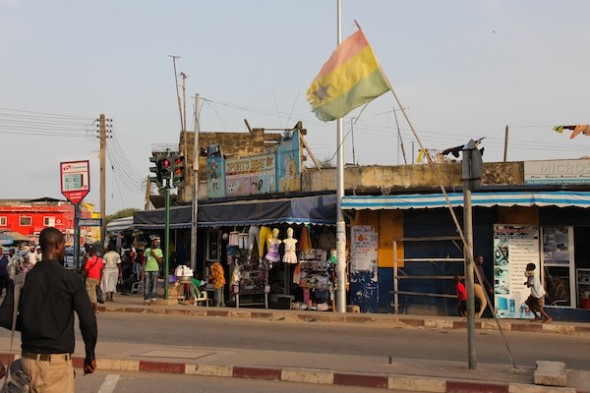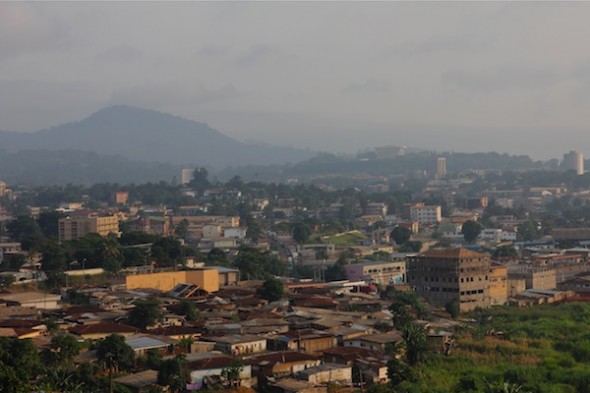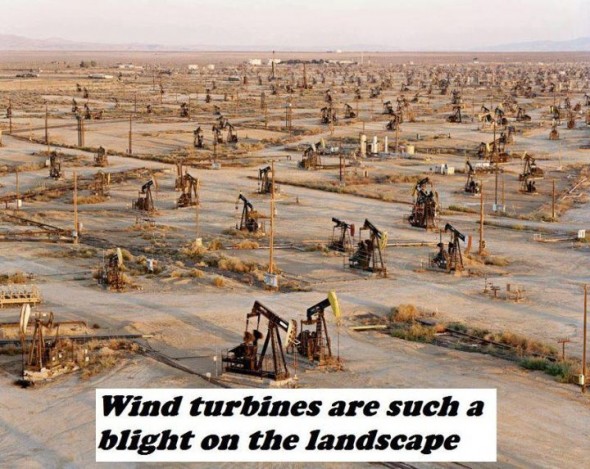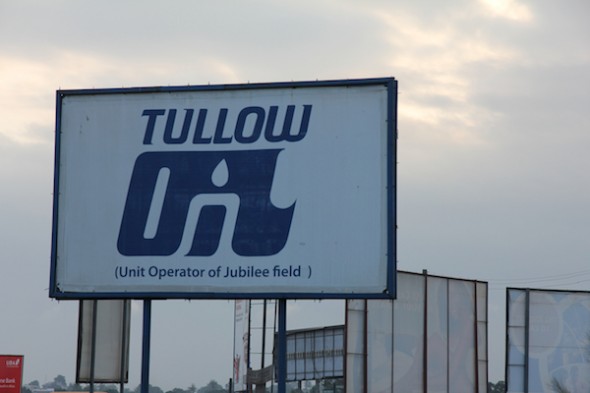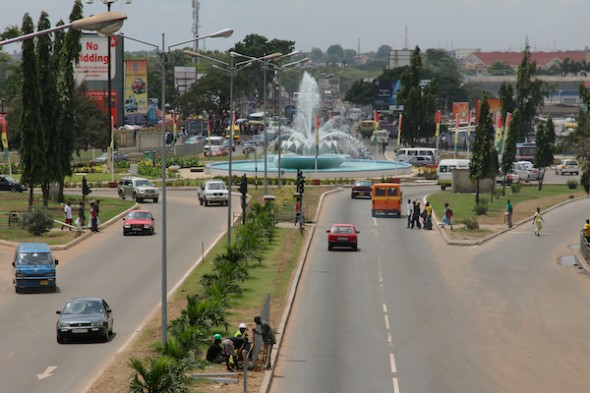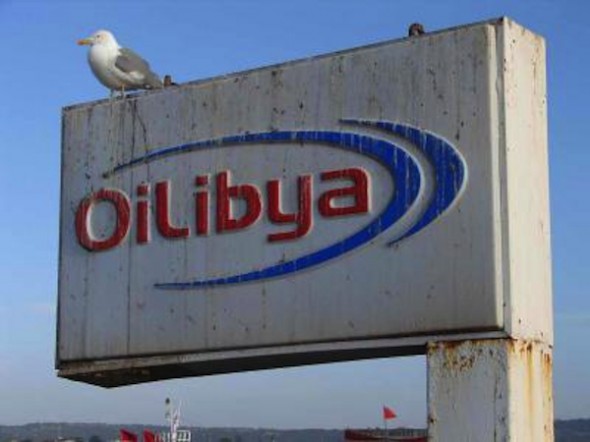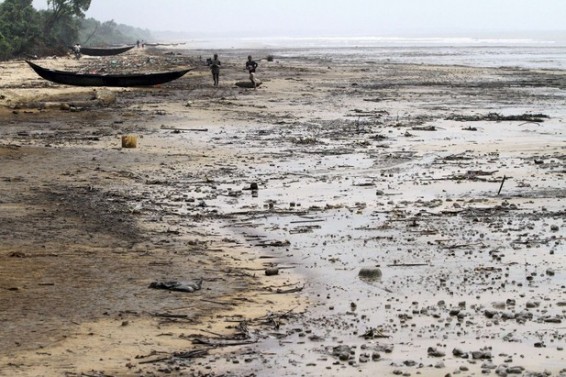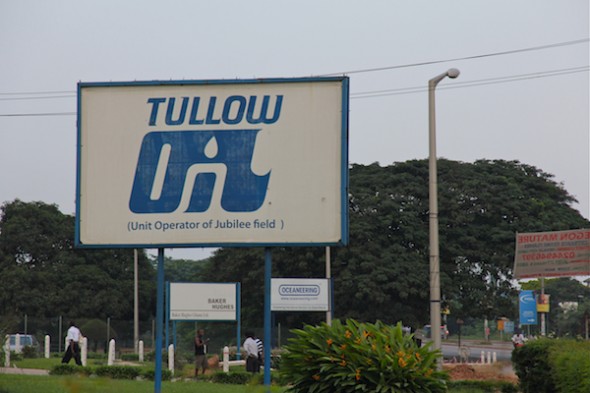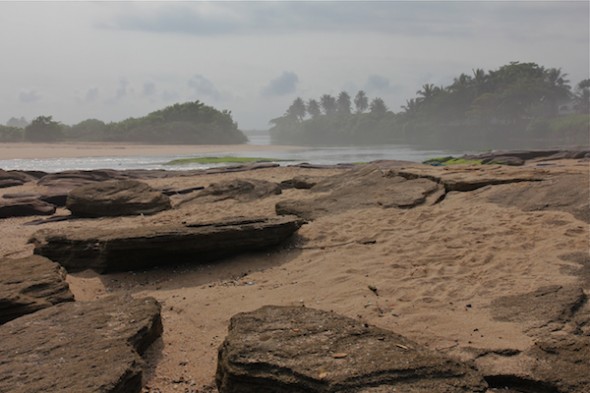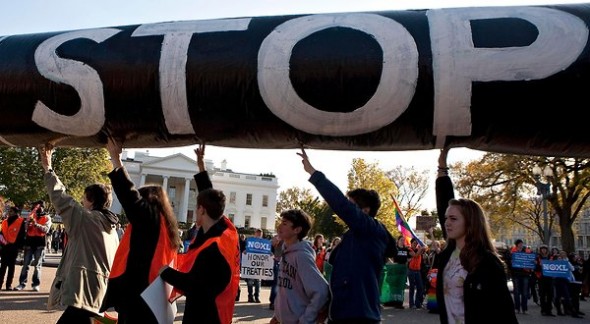Oil vs. fishing in Ghana — the conflicts continue
It has been ages since I’ve posted anything here (more on that below), but it seems that nothing much has changed — at least not for the fishing communities of Western Ghana. I first reported on conflicts between fishermen and Ghana’s new oil industry more than three years ago. Since then, oil exploration and drilling have increased, and the situation for fishermen has deteriorated. In the last few months three reporters have contacted me to talk about conflicts between fishing and oil.
What will it take for Ghana to investigate the surge in whale deaths?
An unusual number of dead marine mammals have been washing ashore in Western Ghana since 2009. Friends of the Nation and other local groups have reported the beached whales to the government and the local EPA office. The government has not investigated and the cause of the deaths remains a mystery. Locals point out that dead whales started appearing in 2009, coinciding with offshore drilling. Many suspect a connection between the whale deaths and Ghana’s oil industry, but without any studies people can only speculate.
Two years ago I wrote about Ghana’s oil industry for the Center for Public Integrity and included information on whale deaths:
Dead whales
In Sekondi-Takoradi, Ghana’s “Oil City,” activists from Friends of the Nation work with the communities closest to offshore drilling operations. In two years of monitoring on behalf of local residents, the group’s Kyei Yamoah, has noted an increase in whale deaths. “A whale washed ashore in October, bringing the total number of dead whales on our beaches since late 2009 to eight,” Yamoah said.
Marine mammals continue to wash ashore in Ghana’s Western Region
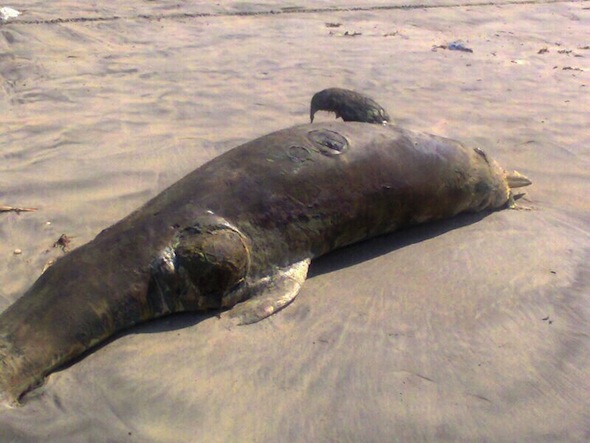
October 21st, 2013: the 19th marine mammal to wash ashore in Ghana’s Western Region since 2009. Photo: Friends of the Nation
From Friends of the Nation, Takoradi, October 23, 2013
The washing ashore of marine mammals in Ghana is still not stopping. On October 20 and 21, 2013, two more mammals were found dead at the coast of Asanta in the Ellembelle District in the Western Region. These carcasses present the 18th and 19th incidents respectively within the last four years. Citizens in the coastal areas are trying to correlate these unfortunate events to the offshore oil and gas, since the production started around the same period (2009). Two dead mammals after each other within just two days caused a shock amongst locals. People in the coastal community are asking for answers.
Offshore drilling, noise and whale deaths: is there a connection?
While working in Ghana last year, I learned that an unusually high number of dead whales had washed ashore since the start of oil drilling. I talked to several local environmentalists who feared the deaths were connected to the country’s oil industry but had no resources to investigate. Without offering any details or study results, the Ghana EPA declared the whale deaths were unrelated to the oil industry.
Although there had been no significant oil spills in Ghana, another form of pollution, which may have played a role in the whale deaths, was ongoing yet invisible: Noise pollution. Shipping and drilling are two known causes of significant underwater noise. Noise pollution — especially when it’s below the ocean surface — doesn’t get much attention. But as a recent article in the New York Times points out, the world’s oceans are increasingly noisy and the impact on marine life, mammals in particular, may be devastating:
Following Ghana election news with Pen + Bytes
Pen + Bytes (PPB), the African ICT journalism training organization, has put together a great Ghana Election 2012 website.
The project, a collaboration between PPB, Star Ghana and the African Elections Project, is aggregating news (print, online, radio and television), posting reports and hosting an election incidence map.
The Blogging Ghana group also launched the Ghana Decides project with live updates. Star Ghana and several international agencies are supporting this work.
Watching the election from afar, it seems that Ghana has a few lessons to offer the U.S. Although people were reported to be lining up before dawn to vote and faced long waits to vote in many places, Ghana’s election day is a public holiday, significantly increasing voting opportunities. We’re still waiting for Election Day to be National Holiday.
Ghana’s oil worries?
I have a decent internet connection this morning, so I’ll take advantage of that to post some of the back and forth between Ghanaian think tank, IMANI, and the Ghana National Petroleum Corporation (GNPC). IMANI has recently published some interesting articles on the Jubilee field’s underperformance. In contrast to the excited tone of most of the business news about the country’s oil industry, the IMANI articles raise serious questions about the industry’s costs and prospects.
Worrying Developments in Ghana’s Oil Sector discusses production levels that are hovering around 60,000 b.p.d. The projected 120,000 barrel daily output has never been met and at this time, it is unclear when production will reach this level. IMANI has questioned both the speed of the Jubilee field development and the original production projections.
Yaounde landing…
I haven’t had a chance to post anything for a few weeks. I’ve just arrived in Yaounde, Cameroon, and hope to have more time to get information up in the coming days. I’m starting some new work and will look forward to writing about it.
In the meantime, I want to provide links to a few articles up at Ghana Oil Watch. As the months go by, the Jubilee Field projected 120,000 b.p.d. output level is looking increasingly like wishful thinking. It has been hard to get clear information on why — exactly — production is so low. Tullow and its partners have repeatedly cited technical issues as the cause, yet now that those issues are supposedly resolved, why haven’t production levels increased?
Oil and fishing, again
Fish vs. Oil Part 1 from Christiane Badgley on Vimeo.
I have been busy the past few weeks and haven’t had much time for posting…But today I have to take out a few minutes to repost an article from the Ghana News Agency (via Ghana Oil Watch).
It has been more than a year since I wrote about the difficult relationship between Ghana’s fishing communities and the oil industry. It seems that nothing much has changed since. The fishing communities are still waiting for an impact assessment. Fishermen say the oil industry is impacting their activities, but without any studies, they have nowhere to go with their grievances.
Continue reading . . .
Dirty oil, dirty money…time to rethink our drilling madness?
I’ve not been writing much lately — too busy with other work. But a number of articles and reports have caught my attention.
Of course, mainstream reporting on oil is generally all good news. It’s the second golden age of oil! Drill, drill, drill. Oil and gas prices will drop! We will become energy independent! Oil and gas will transform economies! Investors will see great returns!
It’s all so wonderful that you can almost forget about climate change and corruption and the fact that we’re really not seeing oil money transform economies in a positive way. Not yet, at least. Oil is bringing in money and raising GDP, but that hardly means life on the ground is getting any better for the average citizen. And, as recent reports from Ghana suggest, oil there is boosting inflation and putting downward pressure on the cedi — hardly a benefit for the people.
Ghana: gas, cash and jobs
IS LOCAL CONTENT A PIPEDREAM? from Channel Two Communications on Vimeo.
There’s been a flurry of excited news coming out of Ghana the past few weeks. Ghana’s growth rate hits 16%. Ghana signs the first $1 billion of its $3 billion loan agreement with China. An additional $6 billion Chinese loan is in the works. The $1.2 billion gas plant project will soon move into high gear. Vice President John Dramani Mahama says Ghana will rake in $1 billion from gas annually and that will allow Ghana to pay off the $3 billion loan ahead of schedule. He predicts the gas industry will create hundreds of thousands of jobs. (Check out Ghana Oil Watch for articles on all this and more.)
Wow! All sounds amazing, but is it too good to be true?
Cameroon quietly ups oil production
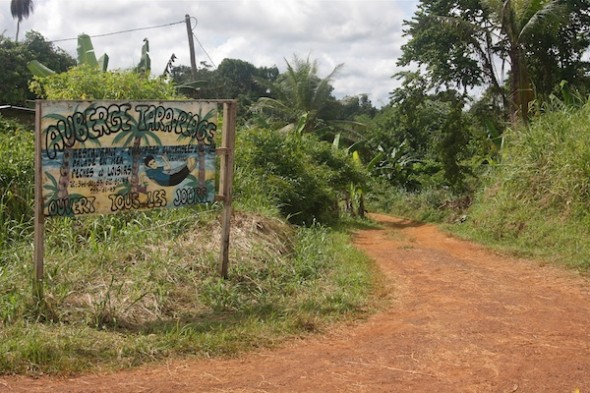
Kribi, Cameroon, where sleepy beach resorts will soon give way to a major port and gas plant. Photo by Christiane Badgley
Cameroon’s oil industry doesn’t get much international attention these days, but like its neighbors the country has seen growing offshore activity over the last few years. After years of declining output, the country’s production levels are once again on the rise.
The Scottish company, Bowleven, has been drilling in Cameroon for several years now and its hits and misses usually get some coverage in the business press. Kosmos Energy, Perenco, Shell, ExxonMobil and Noble Energy, among others, are also actively drilling in the country.
Although Cameroon’s oil production levels are close to those of Ghana, there’s no talk of transparent revenue management in Cameroon. The country recently had its EITI candidacy status renewed for another 18 months. It should be noted that the country was already “close to compliant” in 2010 and hasn’t made much progress since. According to EITI rules, “If Cameroon does not achieve Compliant status by 15 August 2013, it will be de-listed.”
Job woes and local content
The dearth of oil jobs in Ghana is back in the news again.
“Youth angry over elusive jobs in oil industry,” was the title of an article published in the Ghanaian press on March 12th.
The article cites Ebow Haizel-Ferguson from Sigma-Base Technical Services, who urges the rapid development of “ancillary industries.” I interviewed Haizel-Ferguson for “Ghana: Will oil mean jobs?” a short video I produced for the Pulitzer Center .
Oil brings in huge amounts of money, of course, and along with that comes expectations of many, well-paid jobs. The problem is that the industry – at least as it exists in Ghana now – doesn’t generate much work.
“Good” oil companies, “bad” oil companies
Tullow Oil has recently completed a controversial $2.9 billion sale of parts of its Ugandan oil stakes. Tullow’s deal with Total (France) and CNOOC (China), which had been mired in disputes with the Ugandan government for more than a year, was finalized despite a parliamentary resolution to suspend all oil contracts until laws and institutions are in place to fight corruption.
Uganda’s oil reserves appear to be significant, and there are indications that the region could be another oil bonanza. But at the moment, fears of corruption are dampening the mood. According to a recent article from the Associated Press Uganda stands to earn some $2 billion per year for the next 35 years, but:
“All signs are that Uganda will be the latest nation to fall victim to the ‘oil curse’ — cheated of its financial benefits by a corrupt government and left with extensive environmental damage,” said Uganda’s Association of Professional Environmentalists.
Critics are already complaining that more than $300,000 paid in signature bonuses on oil contracts already have gone missing. Legislators have accused the prime minister and two Cabinet ministers of taking millions of dollars in bribes from Tullow — charges Tullow denies.
The controversy surrounding Tullow’s operations in Uganda doesn’t fit with the image of Tullow Oil in Ghana.
Will Ghana’s Marine Pollution Bill become law this year?
I’m happy to see that Ghana’s Marine Pollution Bill is finally on the way to becoming law. I am speaking a bit optimistically here — the bill just received its first reading in Parliament a few days ago — but why not? As I’ve written at iwatch news, the pressure has been on the government to get pollution legislation passed since November’s “mystery” oil spill. Mystery in quotation marks because there is still no official word on what actually happened.
Libya’s oil today: resource curse part two?
News today from Libya and Ghana.
ThinkAfricaPress has published, “Prospects for Libyan Oil: Learning from Iraq”, an interesting article on the future of the Libyan oil industry. Here’s an excerpt:
Increasing the transparency of dealings regarding the ‘black gold’ that lies beneath Libya will be essential to ensuring balanced growth and employment for the Libyan people, but this will prove no mean feat. Given that pressure is unlikely to come from external governments, the incentives and pushes for reform will have to be generated domestically through civil society and a free media.
When getting rid of Gaddafi was so important for U.S./NATO, there was much talk about his abuse of the country’s oil wealth. Now that he’s out of the picture, it’s like, “who cares?” As long as the oil flows…
Ghana’s fishing communities fear oil spills…
…And rightly so.
Yesterday I wrote that Ghana has been producing oil from its offshore Jubilee field since December 2010, yet still lacks monitoring vessels, equipment and personnel.
Something else that’s missing: funds to compensate fishing communities in the event of a spill.
This video recounts the fears of the residents of Abuesi, a small fishing community near Sekondi-Takorad (a.k.a. “Oil City”). Travel up and down the coast, and you’ll hear the same fears echoed again and again.
What will happen when a village that is entirely dependent on its fishing operations for its survival is shut down by an oil spill?
Is Ghana really ready for oil?
Is Ghana ready for an oil disaster? It’s difficult to find officials who want to talk about the subject. Most prefer saying things like, “We learned many lessons from the Deepwater Horizon spill,” and, “It can’t happen here.” Truth is (and everyone knows this), a disaster can strike anywhere.
Ghana has been producing oil from its offshore Jubilee field since December 2010, yet still lacks monitoring vessels, equipment and personnel. The country has an “oil spill response plan” — on paper — but could Ghana actually respond to and deal with a significant oil spill?
This video and a new article published today on iwatch news explore the state of Ghana’s environmental regulation and emergency preparedness.
Bonga field: Back to business as usual
LAGOS, Nigeria — Royal Dutch Shell PLC’s Nigerian subsidiary says it has resumed production at a 200,000 barrel-per-day oil field after containing the worst Nigeria offshore spill in more than a decade.
Spokesman Tony Okonedo said in a statement Thursday that steps had first been taken to ensure it was safe to restart production at the Bonga deep-water oil field.
That’s the word from the Associated Press. Reuters adds a bit more information:
Nigerian villagers say oil from the spill at Bonga, 120 km offshore, had washed up on the coast, blackening stretches of it and killing fish, but Shell has denied that the oil could be from the Bonga facility.
One year already…
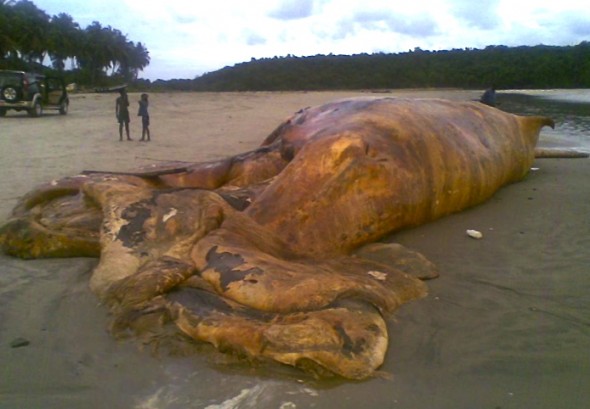
The eighth dead whale to wash ashore in the Western Region since late 2009. The Ghana EPA says there's no connection to oil drilling, but doesn't offer any details to back up the assertion. Photo courtesy of Friends of the Nation.
Yes, Ghana has been an oil producing nation for one year now.
One year on and where do things stand? In terms of environmental oversight, not much has changed and there remains much progress to make.
What’s killing the dolphins?
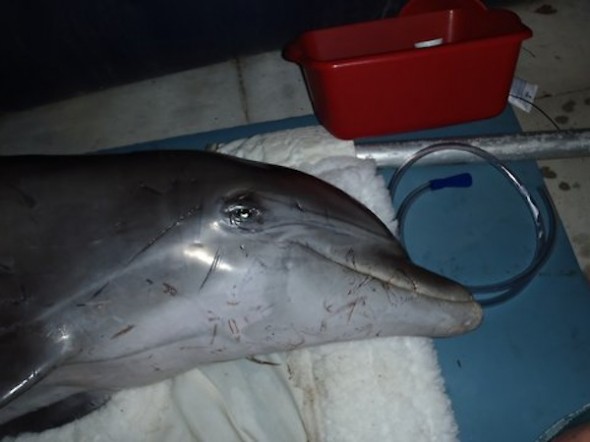
An injured dolphin as it appeared when rescued in Alabama last week. Photo: Institute for Marine Mammal Studies
I read an interesting post in the New York Times Green blog about the dolphin die-off in the Gulf of Mexico. Since early 2010 dead dolphins have been washing ashore at an alarming rate and among the many possible explanations for the 600 dead dolphins is — of course — the BP oil spill. According to the article, which I’m pasting below, scientists are not yet able to determine the cause of the die-off.
This made me think of the recent rash of beached dead whales in Ghana, which, according to the Ghana EPA, is unrelated to the country’s oil activities. I wonder how the Ghana EPA was able to make such a determination so quickly. The New York Times piece gives the impression that determining the exact cause of death of these beached mammals is quite complicated.
Off the radar…
I’m working on a story about the regulation and oversight of the offshore industry across the Gulf of Guinea and should be wrapping it up in a few weeks. That’s been keeping me from posting much lately.
Three weeks have now passed since the spill in the Ahanta West District. I am still unable to communicate any official, on-the-record information about what happened. A few days ago, the Ghana EPA said that the whale deaths in the Western Region could not be “attributed” to oil exploration, stating that there is no scientific proof for that claim. But the main thing to glean from the EPA statement is that no one knows what has caused the recent deaths. We can’t say they were provoked by the oil operations, but we can’t say they were the result of anything else, either.
There’s more news coming out about Jubilee’s production problems. When Ghana’s oil production began in December, the Jubilee partners estimated that production levels would rise to 120,000 b.p.d. within six months. But the “ramp up” has been delayed repeatedly and last month Anadarko, responding to stockholder concerns, went as far as saying that some well redesign was necessary. What had been a delay began to look like a real problem.
From Ahanta West to Accra
Nearly two weeks have passed since fishermen first spotted an oil slick offshore in the Jubilee field area. As they predicted when reporting what they had seen, the oil drifted to shore where it remained until local community members cleaned up the mess.
I’ve been trying to get more information on this spill, which according to someone at EPA, came from a tanker. There’s no way to know with any certainty that this is the case. All the information I have been able to get so far is unofficial. To date there has not been any official statement on the spill — either its source or the amount of oil spilled.
Meanwhile over in Accra, concerns are growing about the financial side of the oil business. I’m pasting an article from VOA below. The reporter writes that,”There remain serious risks the current boom will not be beneficial to most Ghanaians,” and continues with a description of ongoing problems.
Yes, No or…
I’m going to post some additional information on the recent spill in the Ahanta West District, where local communities have more or less finished cleaning their beaches, themselves, without any information from authorities about the source or size of the spill.
In the meantime, in response to massive protests against the proposed Keystone XL pipeline, Obama has decided to…study an alternative route. Decision delayed until after the election: It’s hard not to see this as anything other than pure political calculation.
Unfortunately, the Obama Administration makes no mention of global warming in the decision to delay the decision.
Oil Spill in Ahanta West District
An oil slick, first spotted by fishermen November 3rd, has washed ashore in the Ahanta West District. At this point there is little information available. The government is suggesting the oil leaked from or was dumped by a tanker, but is providing no proof or details. Fishermen report first seeing the slick near the Jubilee field and some suspect that the spill is related to the oil activities. Neither Tullow Oil nor any of the other partners has made any statements, so at this point, it is difficult to know what happened.

